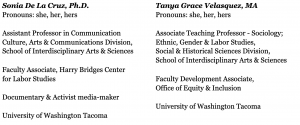From the Instructors
The Transformative Power of Storytelling
In the midst of the chaos and suffering that 2020 delivered, we embarked on this project with some uncertainty about how to address the complexity of anti-racist work in a remote way and coordinate online collaboration knowing our students were overtaxed. However, the gravity of this year and the tragic events most of us have seen unfold, locally, nationally and beyond, deserves unflinching attention. We had faith in our students’ ability to bear witness with humility and candor; they braved courageous conversations for the first time, and unpacked difficult and contentious topics in a remote environment.
The Black Lives Matter movement is a global reckoning that has shaken the world out of complacency and it is a crucial measure of the moral conscience of our nation. To us, Black Lives Matter and the dream of racial justice is the reason we educate for liberation. Our work begins by encouraging an honest reflection about our own racial identities and experiences, hoping students will grow to see the truth about racism and develop a commitment to social justice. As such, these student stories reveal their thoughts and insights about who they are and how they feel about racism in this particular moment when white nationalism is on the rise, as Covid-19 has disproportionately taken the lives of people of color due to economic inequality and structural vulnerabilities, and while social media amplifies the visibility of on-going state sanctioned violence against Black* individuals.
We can no longer look away and be silent.
Through this collaborative project, students have begun to understand their place in relation to social hierarchies of inequality and the implications associated with it, such as the unearned advantages some may have or becoming aware of how little they actually know and why. This project also encouraged them to break silences and challenge master narratives about racial difference/hierarchies, and to tell stories about the complexities and subtle ways race and racism impacts their communities. For many, their stories are approached in intersectional ways and well beyond the borders of this country. In the end, through critical thinking and reflection, students found their creative voice to express righteous indignation, collective grief, fear and resolve.
While this project expands student’s knowledge about race and racism, coupled with creative and inclusive media practices that allowed them to grow intellectually; they also became open to possibilities, to new ideas and a new framework of thought that required a deeper understanding of themselves in order to see the world as it is. It has been our privilege to see how the power of creative expression can be an opportunity for transformation and liberation.
In solidarity with our Black brothers and sisters,
Sonia & Tanya

*Black versus black: In some of the student narratives, students have capitalized the word Black, while others have not. We understand that there are nuanced differences between the two, such as the adoption of the capitalized B to refer to people of the African diaspora, while lower case black refers to a color. For our students, the use of either Black or black is less political and more about an emerging awareness of writing convention. Nonetheless, we are committed to introducing rich conversations about the power of language, labels and sovereignty in self-naming.

